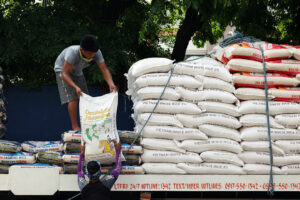BSP set to ease policy further but may stay cautious as Trump jitters linger

BENIGN INFLATION gives the Bangko Sentral ng Pilipinas (BSP) room to reduce benchmark interest rates further, but it could stay cautious due to the economic uncertainty caused by the United States’ protectionist policies, analysts said.
The slower April inflation print affirms that there is room for further easing, BSP Assistant Governor Zeno R. Abenoja also said on the sidelines of the 58th Asian Development Bank Annual Meeting in Milan, Italy on Wednesday, but the pace and size of rate cuts will still need to be studied.
“The BSP has the monetary space to do additional cuts because, number one, the actual inflation for the first four months of the year is 2% — just at the lower end of the target of 2-4%,” GlobalSource Partners Country Analyst and former BSP Deputy Governor Diwa C. Guinigundo said in a phone interview. “Based on actual first four-month average of 2%, and the next three years’ risk-adjusted inflation forecast, the BSP has the flexibility to do it.”
Mr. Guinigundo said he expects the BSP to cut rates by two to four more times this year.
“However, I’m sure the BSP will be more circumspect, more careful in doing further monetary policy easing for the reason that there is greater uncertainty in the global financial markets and in the global economy,” he said, noting the Trump administration’s evolving tariff, tax and immigration policies.
“All of this could translate into higher inflation and lower growth in the US. And since the US is the biggest economy in the world, chances are many of us will be affected in the process. So, I think the BSP will have to monitor what is happening in other economies and what the central banks are also or will be doing in the process.”
Philippine headline inflation slowed to 1.4% in April from 1.8% in March and 3.8% a year prior. This brought average inflation in the first four months to 2%.
Accounting for risks, the BSP expects inflation to average 2.3% in 2025 and 3.3% in 2026.
The central bank resumed its easing cycle last month with a 25-basis-point (bp) rate cut, bringing the policy rate to 5.5%.
The Monetary Board has four remaining meetings this year, with the next one scheduled for June 19.
BSP Governor Eli M. Remolona, Jr. told Bloomberg on Wednesday that they are open to cutting rates by a further 75 bps this year amid cooling inflation.
“The inflation number in April confirms or reaffirms the analysis that was done in the last meeting, that inflation will continue to be manageable moving forward this year,” Mr. Abenoja told reporters.
“At that time, the Monetary Board mentioned that there’s flexibility to support this shift to a more accommodative monetary policy stance. But perhaps the pace, the timing, and the magnitude, we have to look at the data in each meeting.”
Mr. Abenoja said the low inflation in April was partly due to the normalization of food inflation.
He added that cooling inflation is unlikely to be a signal of slowing consumer spending.
“It may not yet be evident that there is a significant slowdown of demand coming from the external shocks. We don’t think this is yet a reflection of that. It’s more of the supply issues resolving themselves, including for rice,” he added. “We could also be benefiting, including moving forward, from the reduction in international oil prices.”
The first-quarter gross domestic product (GDP) report to be released on May 8 (Thursday) will be a crucial data point for the BSP’s next policy decision, Mr. Abenoja said.
“It will be one of the major indicators that will be analyzed by the Monetary Board. So we will see,” he added. “The Monetary Board can discuss how much of that scope of flexibility can be undertaken in the remaining four meetings for monetary policy.”
INFLATION TO STAY LOWFor his part, Pantheon Macroeconomics Chief Emerging Asia Economist Miguel Chanco said he anticipates at least 75 bps more in cuts from the BSP this year following the April consumer price index (CPI) result as inflation is likely to stay within target for the rest of the year
“I wouldn’t be surprised if they went further with 100 bps, given how subdued inflation has been recently and will likely continue to be going forward,” Mr. Chanco said in an e-mail. “Our base case now is that inflation will hover just below the 2% lower bound of the BSP’s target range for the rest of this year, especially with global oil prices tanking amid the US’ trade war.”
“The real rate of interest in the Philippines is still very elevated as things stand, especially in the wake of the recent declines in inflation, so the Monetary Board has ample room to cut rates without overdoing it.”
Moody’s Analytics economist Sarah Tan likewise said they expect the CPI to stay at the lower bound of the BSP’s 2-4% annual target this year.
“Even if global inflation rises due to supply-chain disruptions stemming from evolving US trade policies, it is unlikely that inflation in the Philippines will exceed the upper limit of the target range,” Ms. Tan said.
“Continued progress on the inflation front will create room for further monetary policy easing over the remainder of the year. We anticipate at least one more 25-basis-point rate cut in the second half of 2025. A lower policy rate would help ease the financial burden on households and provide some relief to the domestic economy, offsetting the negative effects of a weakening trade environment as US tariffs increase,” she added.
Meanwhile, Ruben Carlo O. Asuncion, chief economist at Union Bank of the Philippines, Inc. (UnionBank), said they expect inflation to bottom out before accelerating anew by August amid the typhoon season.
Still, UnionBank expects the CPI to remain within target this year and next.
Mr. Guinigundo added that upside price risks could come from potential second-round effects like transport fare and wage hikes.
“Upside risks to inflation remain… At present, the low inflation, low oil prices and strong peso gives the BSP leeway to cut,” Jonathan L. Ravelas, senior adviser at Reyes Tacandong & Co., said in a Viber message. — Aubrey Rose A. Inosante and Luisa Maria Jacinta C. Jocson




